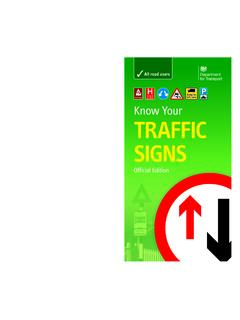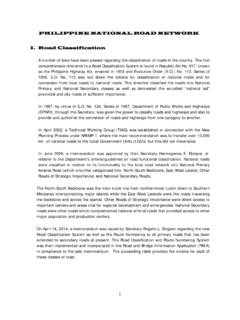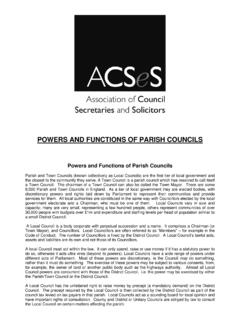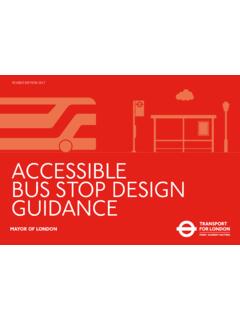Transcription of Decarbonising Transport – A Better, Greener Britain
1 DecarbonisingTransport A B e t te r, Greener Britain 4 5 3 21 Cover Images 1 DAF LF Electric RHD 2 Living Streets 3 Nissan charging 4 London cycle path 5 Metrodecker EV in York. Image courtesy of City of York Council / First Bus The Department for Transport has actively considered the needs of blind and partially sighted people in accessing this document. The text will be made available in full on the Department s website. The text may be freely downloaded and translated by individuals or organisations for conversion into other accessible formats.
2 If you have other needs in this regard please contact the Department. Department for Transport Great Minster House 33 Horseferry road London SW1P 4DR Telephone 0300 330 3000 Website General enquiries: Crown copyright 2021 Copyright in the typographical arrangement rests with the Crown. You may re-use this information (not including logos or third-party material) free of charge in any format or medium, under the terms of the Open Government Licence. To view this licence, visit or write to the Information Policy Team, The National Archives, Kew, London TW9 4DU, or e-mail: Where we have identified any third-party copyright information you will need to obtain permission from the copyright holders concerned.
3 Contents Decarbonising Transport : A Better, Greener Britain 4 Summary of commitments 9 Introduction 14 Part 1 Our path to net zero Transport 22 1a Vision: Clean Transport is better Transport 24 1b How will we deliver this? Our themes to 2050 34 1c The impact of this plan on Transport s emissions 42 Part 2 The plan in detail.
4 Commitments, actions, and timings 48 2a Decarbonising all forms of Transport 50 Increasing cycling and walking 52 Zero emission buses and coaches 62 Decarbonising our railways 72 A zero emission fleet of cars, vans, motorcycles, and scooters 86 Accelerating maritime decarbonisation 106 Accelerating aviation decarbonisation 116 2b Multi-modal decarbonisation and key enablers 128 Delivering a zero emission freight and logistics sector 130 Delivering decarbonisation through places 144 Maximising the benefits of sustainable low carbon fuels 164 Hydrogen s role in a decarbonised Transport system 172 Future Transport more choice.
5 Better efficiency 178 Supporting UK research and development as a decarbonisation enabler 198 Unlocking green finance 204 References 206 3 Decarbonising Transport : A Better, Greener Britain Foreword from the The Rt Hon Grant Shapps MP, Secretary of State for Transport Transport decarbonisation is a dull way of describing something much more exciting and far-reaching. Because Transport is not just how you get around. It is something that fundamentally shapes our towns, our cities, our countryside, our living standards, our health, and our whole quality of life.
6 It can shape all these things for good or for bad. Bad is spending longer and longer stuck in traffic . It s the huge increase in rat-running down roads which were never meant for it. It is millions of people literally, if slowly, being poisoned by the very air they breathe. Every one of these things also contributes to climate change. And decarbonisation is not just some technocratic process. It is how we fix some of that harm. It is how we make sure that Transport shapes the country and the economy in ways that are good. It s about taking the filth out of the air and creating cleaner, quieter, healthier places.
7 It s about a second, green, industrial revolution, creating hundreds of thousands of new, skilled jobs, in some of the proud towns and cities that were the cradle of the first one. It s not about stopping people doing things: it s about doing the same things differently. We will still fly on holiday, but in more efficient aircraft, using sustainable fuel. We will still drive on improved roads, but increasingly in zero emission cars. We will still have new development, but it won t force us into high-carbon lifestyles. Because of the pandemic, some of it is happening faster than we expected.
8 Homeworking has changed traditional commuter and shopping trips, probably for ever. Videoconferencing has changed business travel. These things, in themselves, will save thousands of tonnes of carbon but they also create new challenges, such as a further rise in already proliferating delivery vehicles on the roads. This plan includes clear actions to cut delivery traffic and make it low-carbon, including harnessing new technology and last-mile delivery consolidation. 4 Decarbonising Transport : A Better, Greener Britain Our major Transport infrastructure programmes were designed before the pandemic.
9 We want to understand how changing patterns of work, shopping and business travel might affect them. For that reason, among others, our Integrated Rail Plan, to be published in due course, will describe how HS2, Northern Powerhouse Rail and other major projects will deliver benefits for passengers, including carbon savings more quickly and effectively than under the original proposals, which would have left the North and Midlands and the environment waiting twenty years for any major improvement. And for the same reason, as new demand patterns become clearer, we will also review the National Policy Statement which sets out the government s policies on the national road network.
10 Our ambitious roads programme reflects and will continue to reflect that in any imaginable circumstances the clear majority of longer journeys, passenger, and freight, will be made by road ; and that rural, remote areas will always depend more heavily on roads. That is why our plan to decarbonise motor Transport , the most ambitious of any major country, is so vital. In November, we announced that new diesel and petrol cars and vans would no longer be sold from 2030, and that all new cars and vans must be fully zero emission at the tailpipe from 2035, a plan that is only possible now we are no longer members of the EU.

















